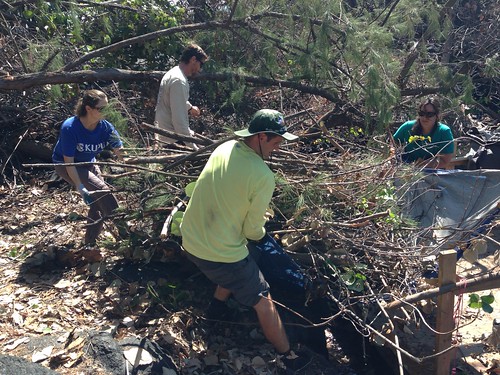
It’s National Preservation Month, and people all over the country are participating in events to enrich and preserve the treasures within their communities that make them special.
Staff from the U.S. Forest Service’s Pacific Southwest Research Station recently helped to restore an ancient Hawaiian fishpond in Kīholo, Hawaii, that has a rich history and tradition of providing a sustainable food source for the surrounding communities on the Big Island. Working in collaboration with The Nature Conservancy and Hui Aloha Kīholo, Station staff from the Institute of Pacific Islands Forestry cleared and hauled debris from the fishpond perimeter in order to reduce the accumulation of sediments caused by overhanging non-native plants, which improved foraging habitat for native fish and turtles. The group also replanted culturally and ecologically appropriate native species, restored habitat for rare invertebrate species, removed invasive weeds, and participated in native plant care within an area surrounding a nearby anchialine pool, which will be used as a nursery for future restoration activities.
Their work was part of an on-going effort to return the fishpond to its previously recorded ecological health, to evaluate the fishpond’s potential for revival as a reliable and sustainable food source within the community, and to improve the surrounding habitat to its former healthy state so that native plants and unique animal populations could successfully return to the area. In addition to saving and rehabilitating a valuable resource, project organizers used the effort to engage the community in fishpond ecology, scientific monitoring and on-the-ground conservation efforts while also connecting people to place.
The preservation project will be used as a platform that combines science and culture to teach and connect the community to each other and to Kīholo. In addition, the project attracts numerous local school groups to the fishpond, and engages volunteers and students in stewardship and research activities, including thinning invasive vegetation that is preventing access, damaging historic structures, and contributing harmful leaf litter to fishpond waters. The Nature Conservancy hosts volunteer restoration days at Kīholo fishpond the third Saturday of each month.

